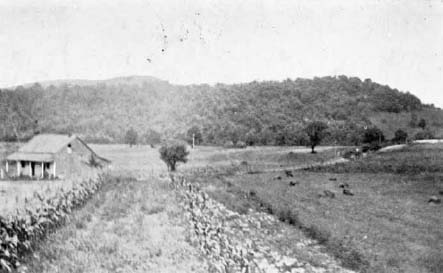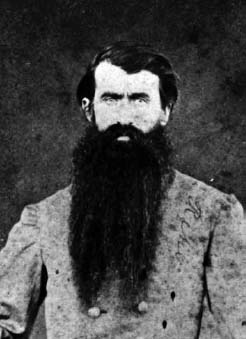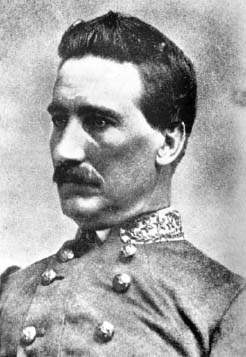The Battle of White Sulphur Springs (19 page)
Read The Battle of White Sulphur Springs Online
Authors: Eric J. Wittenberg

As they so often did, the Confederates used the opportunity to banter with the Union prisoners. “If we had not run out of ammunition we would have whipped you âJohnnie Rebs,'” declared one Federal soldier. “We know nothing about you running out of ammunition, but we do know you run,” retorted a Virginian, to peals of laughter. A different Union soldier responded, “I do not know about us whipping; I tell you that those old Johnnie Reb bullets come singing up the hollow, âwhere are you?' âwhere are you?' Mighty wicked.” The laughter eased the embarrassment for the captured Union soldiers but did little to help them feel better about their plight.
381
A Virginia newspaper noted that the battlefield was the site of a small settlement whose inhabitants fled to escape the violence of the clash of arms. “Mr. Miller, well known as a merchant at Dry Creek, lost his dwelling house and kitchen, which were set on fire by a shell. In his house was consumed all his money, which was in notes, two gold watches, and his furniture, clothing, &c., his family saving nothing, having left precipitately to escape the dangers of the fightâtheir house being between the two armies,” reported the newspaper. The correspondent also noted that other residents of the settlement at Dry Creek suffered similar losses as a result of the two days when the hard hand of war visited their doorsteps.
382

The Miller house, which was located at the center of the battlefield at White Sulphur Springs.
Steve Cunningham
.
Another correspondent claimed that Averell's troopers “treated our citizens in the neighborhood of the battlefield in the most wanton and devilish manner. They destroyed utterly every article of household furniture, broke up into small pieces chairs, cups, plates, dishes, bedsteads, bureaus, &c., tore open the beds and scattered the feathers in the yard, tore up all the bed clothes, &c., wearing apparel, broke the glass out of the windows, and destroyed the clocks even. In a word, not an article of any description was left.” The newspaper correspondent also claimed that the Yankees shot the milk cows and took all of the corn, wheat, hay, oats and other grains, leaving the residents of Dry Creek largely destitute. Such was the hard hand of war.
383
Having successfully driven off the invaders, Sam Jones desperately wanted to catch Averell's command and punish it. The question was whether his forces would be able to do so.
7
Averell's Retreat and the Confederate Pursuit
After conducting a tenacious fighting withdrawal, Averell's weary, hungry men safely arrived at Callaghan's Tavern late on the afternoon of August 27. They built fires and ate their first real meal for the first time in thirty-six long, miserable hours. After resting and enjoying whatever rations they had, the Fourth Separate Brigade resumed the march after sundown, this time heading for Warm Springs. Averell ordered his men to leave their fires burning to create the illusion that they were still there in place to deter the Confederates from continuing to pursue. With a contraband serving as a guide, they took a direct route to the Jackson River Valley, avoiding the winding road to Warm Springs that the Confederates expected them to use.
384
Once Patton's infantry abandoned the pursuit of the fleeing Union horse soldiers, the primary responsibility for the pursuit fell upon the shoulders of Colonel William L. “Mudwall” Jackson and the 19
th
and 20
th
Virginia Cavalry of his command. That morning, Jackson ordered his small detachment of infantry to march to Warm Springs to arrange a warm reception for Averell. Jackson then rode forward himself to take command there. Upon arriving, he heard reports of the fighting at White Sulphur Springs, as well as reports that Patton was falling back in the face of the enemy. He reacted by sending a couple of detachments to move to try to cut off Averell's route of march. Later that morning, Jackson learned that Averell's command had hit the road once more, headed toward Warm Springs, and that he should be on the lookout for it.
385
On the twenty-eighth, a civilian informed Sam Jones that local citizens were blockading the Jackson River road. Jones saw an opportunity and asked them to complete their barricade in the hope that they would slow down the Union cavalry enough for the 20
th
Virginia Cavalry to arrive to resist their passage. Jackson ordered the 20
th
Virginia Cavalry to barricade both the road to Hot Springs and also the Jackson River road. The Southern horse soldiers were in the middle of building their barricades when Jackson learned that Averell had taken a different route and was instead headed toward the Gatewood Plantation in Pocahontas County.
386
Mudwall Jackson failed miserably in his attempts to follow up the Confederate victory at White Sulphur Springs. His pursuit was halfhearted and not well managed. One of Patton's infantrymen was especially blunt in his criticism of Jackson's performance. “If Jackson had of blocked the road and held them in check until we got to him we would have captured the whole of them,” he declared.
387
Whether the Confederates could have bagged Averell's entire command is an open question, but they certainly could have inflicted some serious damage on the blue-clad horse soldiers had Jackson managed to interdict their retreat.
Colonel James M. Corns of the 8
th
Virginia Cavalry, a thirty-four-year-old Welshman and former prisoner of war who had only recently been exchanged in order to return to duty, described the poor effort made by Jackson:
388
At 5 a.m. on the 28
th
, at the hour indicated, I started with five companies of my command and a portion of the Thirty-seventh Battalion, in command of Major
[James R.]
Claiborne, and finding, through my scouts, that the enemy had left Callaghan's about 2 o'clock in the night, I pushed on rapidly with the hope that Colonel Jackson, who I understood was at the Warm Springs, would so blockade the roads and otherwise delay the enemy's retreat as to enable me to come up with him; and it is the opinion of all of my officers and myself that had 100 men been thrown down the road leading from the Warm Springs turnpike to Gatewood's, that they could have so obstructed the road in two hours' time as to have compelled the enemy to abandon all of his transportation and cannon, and perhaps to surrender his entire command.
389
Some of Mudwall Jackson's troopers attempted to spread disinformation that might trick Averell and mentioned to some of the local citizens that the main body of Jackson's cavalry was at Gatewood in force. However, this was a ruse, and Averell saw through it quickly and easily. “This shallow attempt at deception did not deter us from marching to that point, where we arrived at daylight on the 29
th
,” he declared.
390
In the meantime, Colonel Corns pushed his weary troopers as hard and as far as he could. When they were within six miles of the Gatewood Plantation, Corns received a dispatch from Jackson stating that the enemy had passed out of the road where Corns had hoped to intercept Averell's column and had passed Gatewood on the way to Huntersville. Corns made it as far as Gatewood but found it impossible to go fartherâhis horses were at the limits of their endurance and needed to be fed and rested. With no alternative, Corns halted to feed his horses. Not long after unsaddling to feed, Corns received an order from Sam Jones to join with Mudwall Jackson in a vigorous pursuit of the enemy. Corns obeyed the order immediately and marched for Huntersville. However, they arrived too late to catch the New Yorker and his weary horse soldiers.
391

Averell's return route and the Confederate pursuit.
Averell permitted his tired command a few hours of much-needed rest and then moved out again at 9:00 a.m. Colonel W.W. Arnett and his 20
th
Virginia Cavalry, which had pushed its pursuit of Averell's column, came up just short. “Colonel Arnett arrived at Gatewood's in time to fire on the pickets and see the rear of the enemy in rapid retreat,” reported a frustrated Mudwall Jackson, “and following them to Little Black Creek, he turned to the right across the mountain to blockade the Knapp's Creek road.” However, Averell had slipped away again.
392
The Federal horse soldiers marched all the way to Huntersville without interruption, having covered sixty miles in about twenty-eight hours.
393
However, much like their march south, angry bushwhackers constantly plagued the march north. Bushwhackers wounded a trooper of the 14
th
Pennsylvania Cavalry that morning and killed another two.
394
“It was a fearful march, without rest, and constantly harassed by the bushwhackers, who seemed to be in every wooded place, whence they sent into our columns the death dealing bullets,” described a member of the 2
nd
West Virginia. “There was not the slightest opportunity to defend ourselves, and it was warfare that was devoid of the excitement of the battle field, hence the harder to bear.”
395
Jackson's weary troopers pushed on, and his advance elements ran into Averell's pickets at Huntersville, discovering “the enemy there apparently intending to make a stand in supporting distance of the infantry regiment that had been left in their rear,” reported Jackson. After allowing the weary horsemen of the 20
th
Virginia Cavalry a few hours to rest and feed their horses, Jackson ordered Colonel Arnett and his men to make a nighttime advance and get into position to attack Averell. However, when the Confederate cavalry arrived at their destination, they discovered that the Federals were, once more, gone. By now, Jackson's frustration was palpable.
396

Colonel Milton J. Ferguson, commanding Jenkins's brigade of cavalry.
Terry Lowry
.

Brigadier General John D. Imboden, commander of the Northwestern Cavalry Brigade.
USAHEC
.